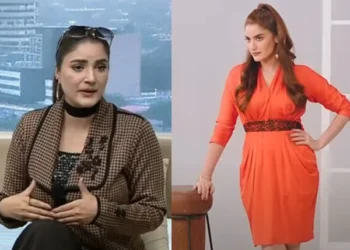Introduction: A Bold Statement From a Rising Star
In a candid and eye-opening interview, emerging Pakistani actress Reham Rafique has shared her concerns about the unsafe environment for women in Pakistan’s drama industry. While the glamorous world of television and entertainment often appears flawless from the outside, Reham’s revelations expose the challenges and risks that women, especially new entrants, must navigate in the field.
Speaking with emotional clarity and professional maturity, Reham Rafique used her platform not only to reflect on her own experiences but also to warn aspiring actresses and highlight the broader gender-based issues prevalent in many professional domains across Pakistan.
An Industry of Dreams—With Hidden Dangers
Reham Rafique, who has gradually carved a niche for herself in Pakistan’s television landscape, emphasized that the drama industry is far from the fairytale many imagine. While it offers fame, financial independence, and creative expression, it also hides toxic competition, jealousy, gender bias, and in many cases, harassment and exploitation.
“There is not just competition here, there are also negative attitudes,” said Reham during the interview.
According to her, this cutthroat competition often leads to unprofessional behavior, including character assassination, lobbying, and gatekeeping—tactics some use to limit others’ opportunities.
Negative Competition Among Female Actors
One of the most striking parts of the interview was Reham’s exposure of jealousy and rivalry among actresses. She clarified that while competition is natural and sometimes healthy, it can become toxic in an unregulated environment.
“I do not believe in competing or comparing myself with anyone,” Reham said, “but I have seen how some actresses create obstacles in the path of others.”
She highlighted that this trend is often driven by insecurity, fear of being replaced, or a desire to maintain dominance in a particular genre or production circle. Such behavior leads to mental stress, isolation, and emotional manipulation, especially for newcomers who lack strong support networks in the industry.
Reham’s Personal Experience: A Balanced Perspective
Despite her warning, Reham clarified that she herself has never faced any direct incidents of harassment or mistreatment, suggesting that experiences vary based on individual paths, associations, and decisions. She admitted that there are good and bad people everywhere, and it depends on the person how they navigate the system.
“It depends on the person which path they choose,” she noted. “I personally have never had any unpleasant incident.”
However, her overall assessment of the drama industry was cautious:
“But overall, I would describe the drama industry as unsafe for women.”
The Broader Issue: Women Face Challenges in Every Field
Importantly, Reham Rafique did not limit her critique to showbiz alone. She used the platform to draw attention to the larger socio-cultural problem—the widespread insecurity faced by women across all professions in Pakistan.
“It is not just showbiz, women are unsafe in every field,” she stated, emphasizing that systemic issues—such as patriarchy, harassment, unequal power dynamics, and lack of accountability—permeate all professional sectors, from media to corporate offices and government institutions.
She urged young women to mentally prepare themselves and learn to safeguard their dignity and professional integrity, especially when entering industries with minimal regulation or oversight.
Women in Pakistan’s Entertainment Industry: Ongoing Concerns
Reham Rafique is not the first to raise her voice on this issue. Over the years, many Pakistani actresses and media professionals have spoken about harassment, exploitation, and the challenges of surviving in a male-dominated entertainment landscape. Notable examples include:
- Meesha Shafi, who opened up about her harassment experience with fellow artist Ali Zafar, which led to a national debate.
- Mahira Khan, who has on several occasions highlighted the need for respectful workspaces and mental health awareness in the industry.
- Nausheen Shah, who also revealed that powerful men and women often manipulate opportunities based on favoritism or personal gain.
Reham’s revelations contribute to this ongoing discourse and reinforce the need for institutional reform, support systems, and stricter codes of conduct in the entertainment sector.
Social Media Reactions: Praise and Concern
Reham Rafique’s interview has been widely shared on YouTube, Instagram, and X (formerly Twitter), sparking a mixed reaction. Many fans praised her for speaking up with honesty and courage, while others questioned whether such statements would create more obstacles for women in an already male-dominated field.
Here are a few representative comments:
- “Appreciate Reham Rafique’s honesty. New actresses need to hear this before blindly entering the industry.”
- “Yes, every profession has its dark side, but it’s important that people in the spotlight speak out.”
- “I hope the drama industry reflects on this and brings in actual policies to protect women.”
What Can Be Done? Solutions for a Safer Entertainment Industry
Reham Rafique’s interview should ideally serve as a wake-up call for stakeholders in the entertainment business. Several steps can be taken to address the concerns she raised:
1. Formal Complaint and Support Mechanisms
Media houses, production companies, and TV networks should establish internal complaint cells, harassment reporting mechanisms, and mental health support for actors and crew.
2. Transparent Casting and Contracts
To minimize lobbying and gatekeeping, casting processes should be standardized with clear contracts, terms of engagement, and unbiased auditions.
3. Workshops on Ethics and Conduct
Regular training on gender sensitivity, professionalism, and mental well-being should be provided to all individuals in the entertainment industry.
4. Mentorship Programs for Newcomers
Experienced actors like Reham Rafique can mentor younger artists to guide them through industry challenges, helping them avoid pitfalls and harmful associations.
Conclusion: A Courageous Voice for Reform
Reham Rafique’s insights into the drama industry’s flaws come at a crucial time when discussions around women’s rights, workplace safety, and media accountability are gaining traction in Pakistan. Her balanced yet firm message is a reminder that true empowerment begins with awareness, honesty, and solidarity.
By speaking out, Reham joins a growing chorus of voices demanding a safer, more equitable entertainment environment where talent, not manipulation or intimidation, determines success. Her message to young women is clear:
“Be prepared, stay strong, and know how to protect yourself.”

























